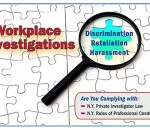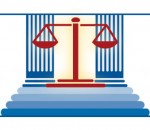-

Current Issue, NYLER Archive, NYPRR Archive, Uncategorized •
admin •
Comments Off on Tinker, Tailor, Lawyer, P.I.: Are Your Workplace Investigations Complying with the Law?
How Attorneys Conducting Workplace Investigations Can Comply with N.Y.’s Private Investigator Law & Rules of Professional Conduct By Ronald C. Minkoff, Lindsay Harris, and Andrew Jacobs The recent high-profile trial in Ellen Pao vs. Kleiner...
-

NYLER Archive •
admin •
Comments Off on Law Firm In-House Privilege Revisited
By Ronald C. Minkoff A recent decision by a Commercial Division judge in New York County has caused shivers of anticipation among New York’s professional responsibility community. In an Interim Order in Stock v. Schnader Harrison Segal & Lewis...
-
NYPRR Archive •
admin •
Comments Off on Rule 5.6: As Written or As Applied?
By: Ronald C. Minkoff [Originally published in NYPRR December 2010] [Note: In this article, I use “partner” and “partnership” as short-hand for, respectively, all the principals in a law firm (including shareholders, members, etc.) and all law...
-
NYPRR Archive •
admin •
Comments Off on Ethical Issues in E-Discovery
By Ronald C. Minkoff [Originally published in NYPRR April 2009] The growth of e-discovery has created a host of ethical problems for litigators, already over-burdened with examining and producing tens (or hundreds) of thousands of electronic documents....
-
Current Issue, NYLER Archive, NYPRR Archive, Uncategorized •
admin •
Comments Off on Who Is My Client? — Vicarious or Accommodation Clients
By Ronald C. Minkoff [Originally published in NYPRR May 2008] When is a “client” not really your client? The answer: When the client is considered a “secondary,” “accommodation,” or “vicarious” client. Though they are often used...
-
Current Issue, NYLER Archive, NYPRR Archive, Uncategorized •
admin •
Comments Off on Who Is My Client? — The Intermittent Client
By Ronald C. Minkoff [Originally published in NYPRR February 2008] When is a client no longer a client? This question may seem simple, but it is fraught with peril for lawyers and their firms. The existence of a continuing attorney-client relationship...
-
Current Issue, NYLER Archive, NYPRR Archive, Uncategorized •
admin •
Comments Off on U.S. Courts v. 50 States — New MJP Issues
By Ronald C. Minkoff [Originally published in NYPRR May 2007] Now that approximately 35 states have adopted some variation of Model Rule 5.5, and a plethora of case law Birbrower v. Superior Court of California, 17 Cal. 4th 119, 70 Cal. Rptr.2d 304,...
-
NYPRR Archive •
admin •
Comments Off on Bona Fide Lawyer Ratings Are Permitted — No Question
By E. Joshua Rosenkranz & Ronald C. Minkoff [Originally published in NYPRR March 2007] [Editor’s note: This article was submitted in response to an article by Lazar Emanuel in NYPRR Feb. 2007.] Last month, the American Lawyer published a list of...
-
NYPRR Archive •
admin •
Comments Off on Extending Government’s Attorney-Client Privilege
By Ronald C. Minkoff [Originally published in NYPRR November 2005] No one disputes that officials at government agencies may invoke the attorney-client privilege in response to subpoenas by private parties to avoid disclosing communications they have...
-
NYPRR Archive •
admin •
Comments Off on Hot Current Topics in Lawyer Supervision
By Ronald C. Minkoff [Originally published in NYPRR August 2004] The New York Code of Professional Responsibility makes it clear that attorneys in law firms or corporate or government law offices who have “direct supervisory authority over another...








